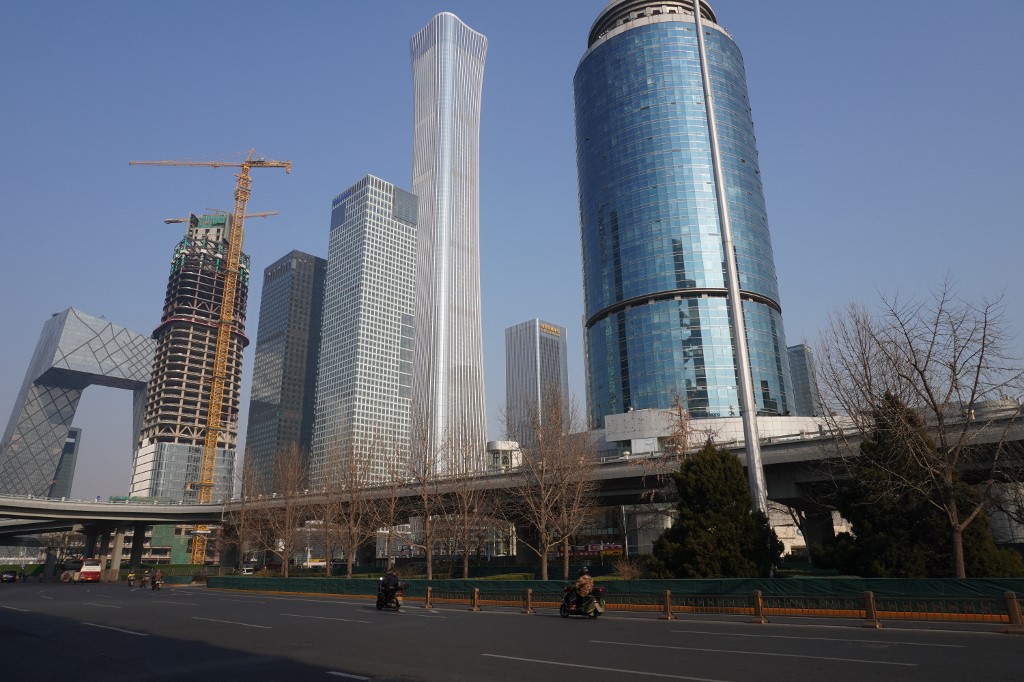(ATF) Chinese real estate developers are seizing a window of opportunity to secure financing after the coronavirus crisis suddenly spurred a flood of ‘loose money’ that could provide a lifeline to many struggling companies.
“We have been communicating with various funders recently, hoping to further grasp this round of easing to reduce financing costs. At present, the market is relatively liquid and the assets are relatively small, so we have been given a window for financing and issuing bonds,” Zhou Yang (a pseudonym), the capital department head of a listed real estate company, told a reporter.
In the six weeks since the start of February, domestic bond financing in China’s real estate sector has totalled 62.1 billion yuan (US$8.82 billion), an increase of 46% over the same period last year (42.5 billion yuan), according to Wind data. During the same period, domestic real estate developers listed in Hong Kong have raised direct financing by issuing US dollar bonds.
The loose liquidity in the context of global interest rate cuts has temporarily given these developers with high financial leverage a respite, opening up channels to obtaining capital at lower costs. Their outlook on the market is much more optimistic than at the beginning of the epidemic, Sina Finance has reported. As investors seek a safe haven in the oversubscribed bond market, it has provided a great opportunity for real estate firms, despite Communist leaders saying China was not going to build itself out of this financial crisis, as in 2008 – but, as they say, old habits die hard.
Over the past two weeks, real estate companies began to grasp as much as possible of this round of financing.
On March 5, Tahoe Group (000732.SZ) issued an announcement saying it intends to publicly issue corporate bonds worth 12 billion yuan to professional investors. According to the plan, Tahoe is expected to meet at the shareholders’ meeting on March 20 for an issue that would be the company’s first domestic direct financing since 2018. The next day (March 6), Tahoe Group’s stock price reached a daily limit.
On March 4, New City Holdings (601155.SH) announced that it would see new financing of up to 30 billion yuan, including foreign currency bonds, in what will be the group’s largest direct line of funds.
On March 12, Shanghai Stock Exchange revealed that Huaxia Xingfu (600340.SH) plans a public issue of corporate bonds worth up to 5 billion yuan. Six days earlier, the group said it had received a notice from the China Interbank Market Dealers Association, saying it would accept the registration of medium-term notes, and the registered amount was 4.4 billion yuan. So, in less than a week, Huaxia Xingfu received more than 10 billion.
Various companies have also supplemented their liquidity through short-term financing.
“With global quantitative easing funds naturally need to find investment channels, and many companies with good financial status will also take this opportunity to increase financing,” Zhou Yang said.
‘Loose funds’
Huatai Securities released a research report recently that noted the boom in supply and demand of real estate bonds was due to “loose funds” from loose monetary policies such as the central bank’s reverse repo operation and MLF decision, and the central government’s increased its support for currency and credit.
However, apart from direct financing, banks’ attitudes have been ambiguous. Real estate is well known for its boom and bust bubbles. “We are still cautious in this regard for the time being and will not increase the blood transfusion going in to real estate,” a large joint-stock bank account manager told First Financial.
Another small joint-stock bank continues to see real estate as a key client for expansion this year. “In general, the risk of real estate is relatively low,” a source familiar with the bank told the reporter.
Financing costs have fallen and large-scale housing companies have become direct beneficiaries. However, many small and medium-sized real-estate companies with high leverage and higher risks have not done so well.
The First Financial found that since March the financing cost of several developers’ overseas dollar debts still exceeds 10%. On March 5, Contemporary Real Estate (01107.HK) issued a US$150 million green limited note due in 2024 with an interest rate of 11.95%. On the same day, Sony Corporation (02103.HK) issued $280 million in senior notes due in 2021 with a coupon rate of 11.75%.
This month, Jingrui Holdings (01862.HK) had the highest overseas financing. On March 9, Jingrui issued additional RegS and fixed-rate senior unsecured notes, worth $10 million and with a yield of 12.75%. And at the end of February, Jiayuan International (02768.HK) issued an additional $67.5 million in senior notes with an interest rate of 13.75%, due in 2022, setting a new high in recent financing costs.
$4 billion in debt due this month
According to incomplete statistics from China Business News, more than $4 billion of real estate bonds will mature in March 2020 – the second highest monthly total debt repayment in 2020.
Facing a tide of debt repayment, some small real estate companies are already overdue.
“Because the real estate market was so popular in the past, many radical developers tended to further reduce their own funds by means of ‘clear equity bonds’ – putting investment in land acquisition funds. Many companies have only 10% of their own funds, which is higher. Faced with such a Black Swan incident, this led to capital risks,” a person who helped the real estate company to match the funds told reporters.
The China Business News reporter said that in the coming year Tahoe Group has about $700 million of debt due, which it will face pressure to pay.
Last November, Standard & Poor’s downgraded its rating outlook for Xinhu Zhongbao (600208.SH) to “negative”. The ratings agency said the company’s deteriorating liquidity could lead to refinancing risks given its massive short-term debt is about to expire. Xinhu Zhongbao reportedly has bonds debts of about $700 million due this month.
Also in crisis is Yida China (03639.HK). According to statistics from Kerer Securities, Yida China became the only real estate developer whose overseas rating was downgraded in February this year. On March 10, it announced that the deadline for unpaid senior notes with a maturity of 6.95% per annum was from March 9 to 16. The First Financial Reporter combed through data and found that in the first half of this year, Yida China had debt totalling over 10 billion yuan.
“At present, funds are mainly looking for risk-averse bolt holes, so large real estate companies have received more financing, and some highly leveraged real estate companies have struggled,” Zhou Yang said.
Everbright Securities believes the industry’s total capital continues to be controlled, and that the overall amount of real estate companies’ debt is still subject to regulatory requirements for borrowing new and old. With loose macro liquidity margins and short-term supply in the primary market, demand will continue to improve the financing costs of high-quality developers. While the financing environment has started to loosen up, the capacity of leading real-estate companies to absorb funds is constantly increasing.
“The crisis is a magnifying glass that magnifies the strengths of your business and also the weaknesses of your business,” Bao Jiming, a professor at the School of Management of Fudan University, said.
- READ MORE: China bond yields near 7-year low
Kerer believes that sales pressure caused by the epidemic will be a big financial test for housing enterprises, and that small and medium-sized firms with weak anti-risk capabilities will go bankrupt and liquidate. “In the first half of the year, the industry reshuffle will accelerate, thus bringing more opportunities for industry mergers and acquisitions,” Ding Zuyu, the CEO of E-House Enterprise Group (02048.HK), said.
In fact, the operation and development of real estate enterprises are linked, and lack of capital guarantees will not expand in the land market, which will result an inability to boost the scale of the market.
More secure players
At present most of the players active in the land market seem to come from housing companies with more secure financial leverage. First Financial found that in February Greentown China, China Resources Land (01109.HK), Xuhui Holdings (00884.HK), Zhongjun Group (01966.HK), Longguang Real Estate (03380.HK), each spent more than 5 billion yuan on land acquisition.
Greentown China acquired over 27 billion yuan worth of land in February and became the number one beneficiary in the current market. As of June 2019, Greentown’s net asset-liability ratio was 58.6%.
Three privately-owned real estate companies – Xuzhongjun Group, Xuhui Holdings and Longguang Real Estate – are also financially sound. As of the first half of 2019, Zhongjun Group’s net debt ratio was 66.2%, while Xuhui Holdings’ net debt ratio was 69.5% and Longguang Real Estate’s net debt ratio was 65.4%.
However, Xu Huafang, president of Baolong Real Estate, believed the land market was overheated in February. “We participated in more than a dozen land auctions, but none were obtained. We thought there were opportunities to pick up and found that many companies are still acquiring land in the market,” Xu Huafang said.
The accumulation of capital brings an accumulation of land, and more talented staff are trying to join the industry.
In the context of layoffs and optimisation in the industry, large companies have begun to outperform small companies in terms of safety and growth rate. Before the Spring Festival, the companies with high year-end bonus coefficients in East China housing were Sunshine City (000671.SZ), Zhongnan Land, Xincheng Holdings, and Shimao Real Estate (00813.HK). These companies ranked first in East China regardless of size or development. The standard of staff and the year-end bonus-level was also higher than other real estate counterparts, which gives them a competitive edge.
First Financial says the indisputable fact is that the industry is giving dividends to these large-scale housing companies, and the fate of housing companies that are out of position is at stake.
“Black swans and grey rhinos are inevitable. The best way to survive is to understand the law and evolve by yourself,” Lin Feng, the president of Xuhui Holdings, said.
























